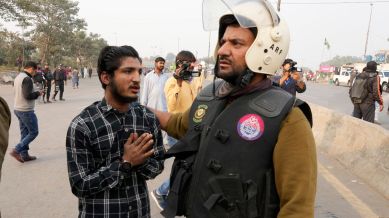US calls on Pakistani authorities to respect human rights, fundamental freedoms
The United States, Miller said, supports the right of people in Pakistan to protest peacefully.

As thousands in Pakistan defied a crackdown to rally for the release of former prime minister Imran Khan, the United States called on Pakistani authorities to respect human rights and fundamental freedoms and to ensure respect for the country’s laws.
At least one policeman was killed and dozens injured in clashes on Monday as thousands of the Pakistan Tehreek-e-Insaf protesters entered the territorial jurisdiction of the national capital on the call of the party founder Khan.
monthly limit of free stories.
with an Express account.
The 72-year-old former premier, who has been in jail since August last year, issued a “final call” on November 13 for nationwide protests on November 24, denouncing what he termed as the stolen mandate, the unjust arrests of people and the passage of the 26th amendment, which he said has strengthened a “dictatorial regime”.
“In Pakistan and around the world, we support freedom of expression, peaceful assembly and association. We call on protesters to demonstrate peacefully and refrain from violence,” State Department Spokesperson Matthew Miller said at his daily news conference on Monday.
“At the same time, we call on Pakistani authorities to respect human rights and fundamental freedoms and to ensure respect for Pakistan’s laws and constitution as they work to maintain law and order,” he said in response to a question.
The United States, Miller said, supports the right of people in Pakistan to protest peacefully.
Led by Khyber-Pakhtunkhwa Chief Minister Ali Amin Gandapur and Khan’s wife Bushra Bibi, the marchers began their journey from the militancy-hit province on Sunday with the mission to stage a sit-in at the D-Chowk, located close to several important government buildings: the Presidency, the PM Office, the Parliament, and the Supreme Court.
The government banned rallies by imposing Section 144, a colonial-era law used to outlaw political activities, as a high-level delegation from Belarus was visiting Pakistan.
But undeterred by the consequences, the protesters pushed forward by removing barricades and fighting with the security personnel.